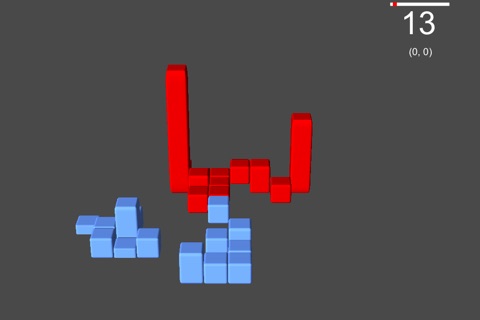
- Octad brings life to Conways Game of Life
- 3D animation with camera auto-tracking
- Two camera views (with zoom capabilities)
- Life rules fully configurable
- Cell pattern manual entry screen (choose a color and tap the grid)
- Reads / writes the popular rle file format (patterns widely available for download on the internet)
- Up to 4 colors in a cell pattern
- Real time detection of Still Life, Oscillators and Spaceships
- Analysis: computes heat, volatility, bounding box, speed, etc. (for oscillators and spaceships)
- Plot live cells vs generation
- Play, Pause, Rewind, Fast-forward through generations
- Airdrop support
Birth, Growth, Death:
Octad provides a 3D view of the cells. At generation 0, live cells are all the same height. As new generations are displayed, new cells are born, while some die. But cells that survive from one generation to the next will continue to grow in height, until their death, as dictated by the rules (i.e. the status of their eight neighbors - the octad). All of this in animated 3D, providing a fascinating spectacle of what, at times, seems like city blocks with buildings of different heights. As Octad tracks the age of each cell, it also provides the option of setting an age rule: the maximum age a cell can get (in generations) before it dies. Familiar 2D patterns will suddenly look different in 3D: the Blinker will become the Corkscrew; and the Block will become the Skyscraper
Color:
Octad allows initial patterns to contain up to 4 different cell colors. A newborn cell will be the color of its most numerous contributing neighbor, or white if there is a tie. Colors are a way to study the genetics of patterns: which positions in the pattern are dominant, and more likely to transmit their colors to future generations?
Rules:
The rules of Life are simply defined by survival conditions (2 and 3 neighbors for the standard rules) and birth conditions (3 neighbours for the standard rules). Widely different behaviors results when these rules are modified. Octad allows you to set survival conditions from 0 to 8 neighbors, and birth conditions from 1 to 8 neighbors.
The Science behind the Game:
Although called a "game", Life and similar cellular automata have been and are still the subject of very serious studies. The generation of complex patterns or entities from very simple rules is believed to be behind several natural processes. Octad brings a different perspective to the magic behind the Game of Life, enhancing the fascination generated in both adults and children when presented with a few simple entities (cells), which are seemingly becoming alive and organizing themselves in widely different patterns, without any directions other than a couple of trivial rules.


